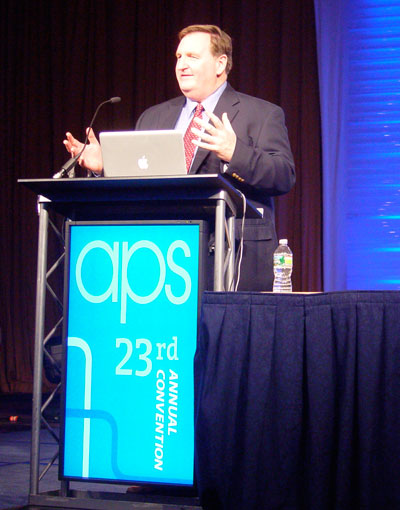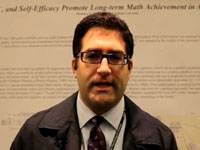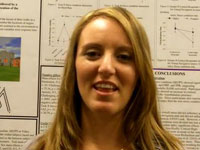Do We Dare to Change America’s Diet?
 In his Bring the Family Address at the APS 23rd Annual Convention, Kelly D. Brownell of Yale University charged convention-goers to ask themselves whether we have the courage necessary to change America’s diet. Brownell, a psychological scientist and Director of the Rudd Center for Food Policy and Obesity at Yale, argued that this courage is essential because of the many obstacles – including powerful economic forces – that stand in the way of promoting health in the United States.
In his Bring the Family Address at the APS 23rd Annual Convention, Kelly D. Brownell of Yale University charged convention-goers to ask themselves whether we have the courage necessary to change America’s diet. Brownell, a psychological scientist and Director of the Rudd Center for Food Policy and Obesity at Yale, argued that this courage is essential because of the many obstacles – including powerful economic forces – that stand in the way of promoting health in the United States.
Over the last 25 years, the rate of obesity has risen dramatically in the United States. Now, over a quarter of the population in more than 30 states is considered to be obese, having a body mass index of 30 or greater. The nutrition and diet of children in the United States are particularly concerning — Brownell noted that only 20 percent of American children are getting the recommended amount of fruits and vegetables every day.
It’s important to recognize that these issues are no longer limited to developed countries in the Western world. Projections suggest that between the years 2000 and 2030, diabetes will increase by about 75.5% in China and by a whopping 134% in India. The fact that the incidence of these nutrition-related diseases is increasing so rapidly in developing countries has come as a shock to many. We never really thought “we would reach a day where we saw over-nutrition in countries like India and China,” Brownell said.
So, what’s causing these increases in nutrition-related diseases? Brownell argued that food marketing plays a very important role, especially for children. The average preschooler in the United States sees three advertisements for fast food every day. And traditional television and print ads are now being joined by other types of marketing, including guerilla and viral marketing. One type of food marketing, known as product placement, is common across various types of media. To prove this point, Brownell showed an image taken from “American Idol,” in which Coca-Cola cups are prominently placed across the judges’ table.
According to Brownell, the reality is that mere education will not be enough to address these public health issues – providing people with information will never compete with the marketing strategies of the food industry. So what can we do? A good place to start, he argued, is with upstream policies that directly address dietary issues, including regulations on advertising and taxes on sugared beverages. While we might wonder how any one of us as an individual can effect this kind of change, Brownell emphasized the idea that change can start with a phone call to a legislator. At the beginning of his address, Brownell asked whether we would really be able to “wipe the slate clean and start with a brand new model.” His answer was summed up in one emphatic word: “Yes!”





Comments
A “revolutionary” idea, one that harks back to WWII, is to help Ammerican families grow more of their own food. Backyard gardening could supply as much as 40% of American’s produce and encourage healthier eating. Urban gardens, adult education classes, public school gardens, and universale instruction on food production — these are essential steps to reduce processed food consumption.
This was such a compelling presentation. I hope that APS makes this one available on video because it would be extremely useful in the classroom.
APS regularly opens certain online articles for discussion on our website. Effective February 2021, you must be a logged-in APS member to post comments. By posting a comment, you agree to our Community Guidelines and the display of your profile information, including your name and affiliation. Any opinions, findings, conclusions, or recommendations present in article comments are those of the writers and do not necessarily reflect the views of APS or the article’s author. For more information, please see our Community Guidelines.
Please login with your APS account to comment.